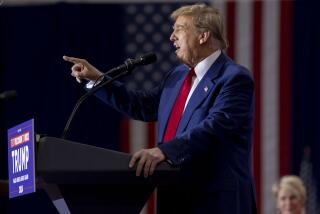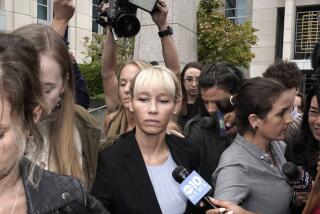Proposal Gives Nixon Lawyers $10 Million
Lawyers for the estate of Richard M. Nixon would be paid close to $10 million under a proposed $26-million settlement with the government to compensate the late president’s heirs for seizing his White House tapes and documents, according to sources familiar with the plan.
About $4.3 million would pay for fees incurred in more than 20 years of litigation going back to 1974. That year, Congress passed a law to put Nixon’s records under federal control, and to provide the public “with the full truth, at the earliest reasonable date, of abuses of governmental power popularly identified under the generic term, ‘Watergate.’ ”
An additional $5.4 million would go to Nixon estate lawyers for contingency fees and expenses in preparing for trial in federal court here on the compensation issue. The trial is supposed to begin later this year before U.S. District Judge John Garrett Penn, but an out-of-court settlement would obviate the need for such a proceeding.
A Justice Department spokesman, Bert Brandenberg, said Wednesday that reports of a settlement were “extremely premature” and that unless one is reached, “the department will be ready for trial.”
A government appraiser has been evaluating the collection of tapes and documents but has not yet put a price tag on the materials, sources said. Attorneys for Nixon’s estate and the government have not yet asked Penn to set a firm trial date, although court papers show they envisioned a start in June.
Penn ruled in 1991 that Nixon held the materials “as a trustee for the American people” and was not entitled to any payment for them. Penn was reversed the following year by a three-judge appeals court panel, which sent the case back to him for “a determination of the compensation due.”
The legal fees would constitute the biggest portion of the settlement under discussion. Under the proposal, the National Archives would take charge of the privately run Nixon Library & Birthplace in Yorba Linda and ship the Nixon collection of more than 44 million items to a new facility to be built with part of the payment. The facility is estimated to cost $8 million.
Most of the remaining funds would go from the former president’s estate to the Richard Nixon Library and Birthplace Foundation, which would continue to run the Nixon museum at Yorba Linda and maintain the nine-acre grounds.
Public access to the late president’s papers would continue to be governed and restricted by the law passed by Congress in 1974. With 35 million items still to be processed, critics of the move to California contend that public access to the papers will be diminished even as public funds are being spent to pay for them.
Implemented by a series of arcane and sometimes puzzling regulations, the 1974 law calls for release of materials of “general historical significance,” as well as those related to the Watergate scandal. It also calls for the return to Nixon or his heirs for their “sole custody” private materials that are “not otherwise of general historical significance.”
The implementation of these rules by the Archives, however, has led to suppression of many political items, such as materials dealing with Nixon’s decision in 1972 to get rid of then Republican National Committee Chairman Robert J. Dole. Despite what might seem their “historical significance,” some of the materials have been deemed “private/political” because Nixon was acting not as president, but as head of the Republican Party.
Last week, U.S. District Judge Norma Holloway Johnson ordered the return to the Nixon estate of segments of more than 800 hours of Nixon tapes--containing “personal or private conversations.” Archivists have contended--so far, in vain--that the original White House tapes are artifacts of historical significance and that they are too fragile to be spliced. A Justice Department spokesman said the question of appealing Johnson’s decision is “under review.”
More to Read
Start your day right
Sign up for Essential California for news, features and recommendations from the L.A. Times and beyond in your inbox six days a week.
You may occasionally receive promotional content from the Los Angeles Times.






